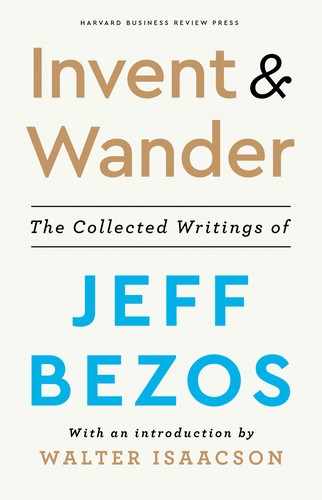Physical Stores and Whole Foods
WE HAVE BEEN very interested in physical stores for years, but I always said we were only interested in having a differentiated offering, something that’s not me-too, because that space—physical stores—is so well served. If we had a me-too product offering, I knew it wasn’t going to work. Our culture is much better at pioneering and inventing, and so we have to have something that’s different. And that’s what Amazon Go is. It’s completely different. The Amazon Bookstore, completely different. And we have ideas about how to merge Prime and Whole Foods to make Whole Foods a very differentiated experience.
Amazon buys a lot of companies. Usually they’re much smaller than Whole Foods, but we buy a bunch of companies every year. When I meet with the entrepreneur who founded the company, I’m always trying to figure out one thing first and foremost: Is this person a missionary or a mercenary? The mercenaries are trying to flip their stock. The missionaries love their product or their service and love their customers, and they’re trying to build a great service. By the way, the great paradox here is that it’s usually the missionaries who make more money, and you can tell really quickly just by talking to people. Whole Foods is a missionary company, and John Mackey, the founder, is a missionary guy. And so what we’re going to be able to do is take some of our resources, some of our technological know-how, and expand the Whole Foods mission. They have a great mission, which is to bring organic, nourishing food to everybody, and we have a lot to bring to that table in terms of resources but also in terms of operational excellence and technological know-how.
